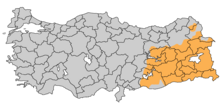Northern Kurdistan
Northern Kurdistan (Kurdish: Bakurê Kurdistanê or Kurdistanê Bakur) or Turkish Kurdistan, refers to the eastern and southeastern part of Turkey[1] where Kurds are majority people. According to Kurdish Institute of Paris, the total population of region is 14,2 million in 2016 and according to several surveys, 86% of them are Kurds.[2]

Demographics[change | change source]
In the first census of Turkey in 1927, Kurdish was the largest first language in the provinces of Ağrı (58%), Bitlis (75%), Diyarbakır (69%), Elazığ (53%), Hakkâri (89%), Mardin (61%), Siirt (74%, includes present-day Batman) and Van (77%). Moreover, Kurdish was the largest first language with a plurality in Şanlıurfa with 42%.[3] 69% of the population in Muş Province had Kurdish as their first language in the census of 1935, the first census conducted there after the province was split from Bitlis earlier.[4] Dersim's (Tunceli) language distribution is 69.5% Kurdish and Zaza in 1927.[5] Bingöl Province was separated from Muş in 1935, while Tunceli Province was separated from Elazığ in 1936 and Kurdish was also the first language in these newly-established provinces in their first census in 1945 with 56% and 53%, respectively.[6]
References[change | change source]
- ↑ van Bruinessen 2004, p. 479.
- ↑ "The Kurdish population". Kurdish Institute of Paris "The territory, which the Kurds call Northern Kurdistan (Kurdistana Bakur), has 14.2 million inhabitants in 2016. According to several surveys, 86% of them are Kurds, the remainder being Arab minorities (Urfa, Mardin, Siirt) and Turkish (mainly military , police and civil servants), as well as Syriacs and Armenians."
- ↑ Dündar 2000, p. 156–157.
- ↑ Dündar 2000, p. 164.
- ↑ Sertel 2016, p. 8.
- ↑ Dündar 2000, p. 178–179.
Sources[change | change source]
- van Bruinessen, Martin (2004). "Kurdistan". In Joel Krieger (ed.). The Oxford Companion to Politics of the World (2nd ed.). Oxford University Press. p. 479. doi:10.1093/acref/9780195117394.001.0001. ISBN 9780199891160.
The name given to the homeland of the Kurds, a Muslim people numbering approximately 20 to 25 million, Kurdistan comprises most of eastern and southeastern Turkey, northern Iraq, parts of northwestern Iran, and small slices of northeastern and northwestern Syria.
- Dündar, Fuat (2000). Türkiye nüfus sayımlarında azınlıklar (in Turkish). Doz Yayınları. ISBN 9789758086771.
- Sertel, Savaş (2016). "Türkiye Cumhuriyeti'nin İlk Genel Nüfus Sayımına Göre Dersim Bölgesinde Demografik Yapı". Fırat Üniversitesi Sosyal Bilimler Dergisi (in Turkish). 24 (1): 8. doi:10.18069/fusbed.82073 (inactive 2024-01-24). ISSN 1300-9702.
{{cite journal}}: CS1 maint: DOI inactive as of January 2024 (link)
